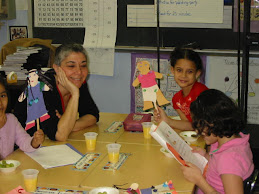 |
| My Grandma "Mary," c. age 20 |
My grandma, Maria Fekete, was the eldest child in her family. As a gift for her 16th birthday, in 1906, her family scraped together enough money for a ticket, via steamship, from Czechoslovakia to the United States. This was quite an honor, an opportunity for a new and surely better life than peasant farming had to offer.
It was the last thing Maria wanted.
Life in her little village near Prešov wasn't always easy. The children had to work on the farm, about four hours a day. They had goats and cows, geese and pigs. They grew potatoes and oats and flax to make their own linen. In the winter months the girls walked great distances, through snow and darkness, to attend school from 8:00 to 5:00. They would stop off at the homes of relatives to warm their frozen feet by the fire.
 |
| Snowy farm in Presov |
Yes, the family made everything they could possibly need. Except money. Although the girls helped out on the farm, their efforts were not essential, and there were no paying jobs to be had in Prešov. So when her mother's brother's wife's sister, who was already in the states, told of a Hungarian family who needed a housekeeper, and offered to sponsor one of the Fekete girls, my grandmother Maria was the obvious choice. She was the eldest, the smartest, and the best worker.
So off she headed, without a disrespectful word of protest, alone, miserable. And sixteen.
Things could have been worse. She had her own bedroom with the Weingartens, the Hungarian Jewish family she kept house for, on 9th Street. Although Maria spoke no English, she found a small community of folks from home in the neighborhood, including her mother's sister-in-law's sister, who had gotten her the job. Maria did speak a little Hungarian, just little enough to completely confuse ingredients and render inedible the very first dinner she made for the Weingartens. Her sickly employer helped salvage things before her husband, a professor, came home from work. But my grandmother, who was used to four or five hours a day of work on the farm, now worked sun up to sundown, with no time or energy for socializing, or improving her English, or feathering her own nest with the modest money she now made.
Mrs. Weingarten died within a few years, and another several years later my grandmother became the new Mrs. Prof. Weingarten. They had a daughter, my aunt Helen, and when Helen was three, Maria became a young widow. She met John Lesko, a factory worker from her hometown, through friends the following year, and they were married in 1925. My Uncle Joe and my father came along shortly after, and my grandmother gradually lost touch with, and stopped mourning, her family and life in Prešov.
 |
| My grandma and me, c. age 20. |
So me? Married at 21, never left New York. My kids are growing up and out, cleaving more to mates than mom, and I am undone. I like to pretend I'm living on the edge by taking this sabbatical, planning a month in a cutems apartment on the artsy side of Rome, completely alone for a few of the weeks. But at our early Christmas celebration, relatives inquired nervously if I was taking on too much, and my stomach churned as I lied with breezy bravado. I was even uneasy at the fact that our Christmas celebration was of necessity a week early, and Christmas was quiet and, well, just hand-wringingly wrong. I'm completely frazzled by today's blizzard delay of my flight. I want very much to practice my Italian while in Italy, walk the TESOL walk, you know, but I am seriously apprehensive about making a fool of myself.
I know just what Grandma would say if I asked her advice, my hearty, tough, peasant Grandma. She who had weathered a voyage to a very foreign country at the age of 16, the loss of her entire family, early widowhood, remarriage to my grandfather whom she would describe to my mother as "just no good." Russian occupation of her homeland, and nowhere to really call home.
If I told my grandma I was afraid, she'd have a simple bit of advice, I'm sure.
"Ah, you make me sick."


1 comment:
joan, that was lovely — honest and pure. let's get together after you get back and get to know one another.
Sauna
Post a Comment